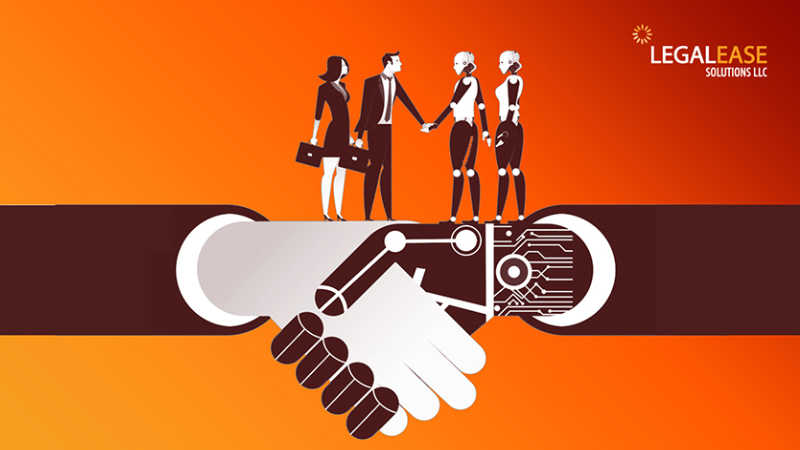The legal system is undergoing a technological revolution and Artificial Intelligence (AI) is the new buzz word. AI can serve as a substitute for lawyers for performing routine, non-billable and structured tasks such as basic documentation and contract drafting. AI-enabled personal assistantprograms can efficiently handle administrative operations in law firms such as payroll and resource management, scheduling meetings, and client billing. Similar AI programs are available in the market for hiring paralegals and associates, and helping them complete document reviews and formatting in specialized practice areas like patent applications. AI can also help law firms monitor their time and activities, and generate electronic billing.
“The IBM Watson super computer used by Ross intelligence has the ability to respond even to plain language. “
AI has appreciative value because of the reduction in work hours that it facilitates through onlineresearch platforms, and apps such as ROSS Intelligence’ and ‘Applied Cognitive Engine (ACE)’ or ‘LONald’[1]. These tools carry out legal research within minutes, saving several hours that would have normally been expended if it were to be carried out manually. The efficiency of AI-enabled research is compelling. For eg: the IBM Watson super computer used by Ross intelligence has the ability to respond even to plain language.
“39% of legal jobs are likely to be automated within the next couple of decades.”
The massive potential of AI is leading to rapid changes in the legal industry. There is a strong concern in the legal sector that AI poses a threat to attorneys. A recent survey conducted by Deloitte revealed that over 100,000 or 39% of legal jobs are likely to be automated within the next couple of decades[2]. AI assists in the reallocation of tasks, especially in large law firms, where the payoff is substantial. It reduces the resources and manpower used in legal processes, in turn reducing legal costs.
Lawyers are often asked to predict the future of legal cases, for eg. the win/loss percentage of their case or the cost incurred for the client[3] , to advise the client whether to settle the case, take a plea or attempt trial. Since Artificial Intelligence can access and analyze more data, it is more equippd to predict the results of legal disputes and proceedings[4]. For eg: the Supreme Court forecasting project predicts the outcome of cases by using data from previous court judgments (US Supreme Court), Legal Analytics by Lex Machina mines data and reveals valuable insights to lawyers and judges alike[5], and uses data from litigation, natural language processing, and machine learning to predict the outcomes of cases.
“Artificial intelligence’s algorithms are designed to speed up document processing and error detection. This can tremendously reduce the work hours of lawyers (13% according to a recent survey).”
National archives suggest that a statute book contains around 50 million words in it, with nearly 100,000 words being altered every month[6]. Law firms and lawyers who have to cull this data can use Al tools like LexisNexis, Thomson Reuters and the Incorporated Council of Law Reporting to improve the quality of their legal research. Artificial intelligence’s algorithms are designed to speed up document processing and error detection. This can tremendously reduce the work hours of lawyers (13% according to a recent survey). AI also helps lawyers focus more on strategic thinking, and to effectively answer client questions and offer the best possible solutions.
However, a major setback of Artificial intelligence is that it learns from information received from the outside world. Such systems can operate independently from their creators or operators, thus complicating the task of determining responsibility.
Yet another limitation is AI’s proficiency at legal analysis. Artificial intelligence cannot completely understand the complex nature of human disputes and transactions, since it lacks the ingeniousness of human thinking[7]. AI is not meant to replace lawyers but merely to aid them by simplifying their work, and allowing them to spend less time on manual tasks and more on advising clients. Undoubtedly, the legal profession is going through a revolution. From online legal research platforms to customised apps facilitating general tasks, the legal domain has come a long way from the tradition-bound and labour-heavy legal industry that it used to be. Artificial intelligence is changing the way lawyers think, i.e. the way they communicate with clients and the way they do business.
The pressure to adopt Artificial Intelligence is building in the legal sector. Companies who do not implement AI may find it challenging to maintain their competitiveness on account of being overpriced. On the other hand, companies that embrace it can advance faster, make considerably higher savings, and more effectively fulfill their clients’ needs.
At LegalEase, we are constantly aware of automation advances and strive to utilize third-party tools to develop technology-abled solutions for our clients. We use proprietary CORE research and activity automation engines to reduce human involvement and error, thereby streamlining processes and ensuring our clients the fastest, most accurate results. If you’d like to optimize your legal functions, feel free to reach out to us at contact@legaleasesolutions.com. Our team of expert attorneys is happy to help.
References
[4] https://www.techemergence.com/ai-in-law-legal-practice-current-applications/
[6] http://www.infolaw.co.uk/newsletter/2017/11/artificial-intelligence-law-perspective/




